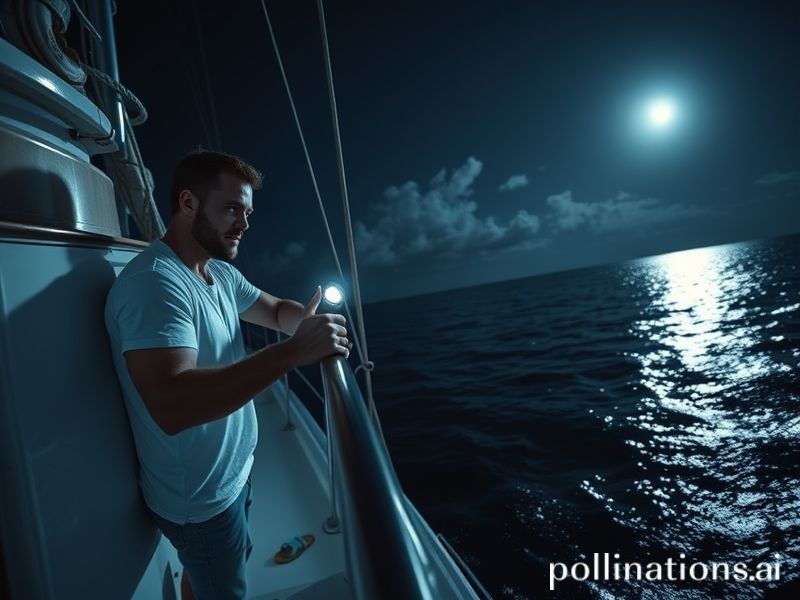The Vanishing at Frank Bay: How a British Yacht Mystery Became the World’s Favorite Unsolved Podcast
Somewhere between the gin-clear shallows of St. John and the algorithmic abyss of true-crime TikTok, Sarm Heslop vanished—leaving behind a single flip-flop, an American boyfriend with a name too cinematic to trust (Ryan Bane, really?), and a global audience that now treats Caribbean tragedy like a Netflix limited series. Three years on, the case still pings from London breakfast shows to Perth podcasts, proof that in 2024 a missing 41-year-old Brit can become a planetary campfire tale faster than you can say “extradition treaty.”
The basic facts are elegantly Caribbean: midnight, March 8, 2021, catamaran Siren Song moored off Frank Bay, the sort of postage-stamp cove cruise brochures call “unspoiled” because they haven’t yet installed a swim-up bar. Heslop, a former flight attendant who’d traded contrails for trade winds, goes to bed; Bane reports her gone at 2:30 a.m.; local police arrive—then leave—because, as one officer told the BBC with the shrug heard ’round the Commonwealth, “We don’t board boats without probable cause.” By the time Britain’s Foreign Office decided the phrase “British citizen” still entitled you to more than a Zoom condolence, the tide had done what tides do: rearranged the deck chairs of evidence.
Cue the international circus. British tabloids flew in paparazzi seaplanes. American true-crime influencers held livestream vigils from their basements in Ohio. German sailing forums argued about whether the AIS transponder had been switched off or simply succumbed to Caribbean humidity—because nothing says “open ocean” like Bavarian IT consultants. Meanwhile, the U.S. Virgin Islands Police Department—whose jurisdiction ends where the coral begins—discovered it had all the authority of a substitute teacher on prom night. Scotland Yard offered “support.” The FBI offered “observation.” Ryan Bane offered a lawyer and the kind of silence that billable hours buy.
From a planetary perspective, the case is less whodunit than who-doesn’t-want-to. Britain wants answers because a mother in Southampton keeps getting doorstepped by Sky News. The U.S. wants the story gone before tourism brochures need a new tagline (“Come for the snorkeling, stay for the subpoena”). Social media wants closure in ten episodes or fewer, ideally with a cliff-hanger that boosts Q3 engagement metrics. Everyone, in short, wants justice on their own bandwidth.
And therein lies the darker joke: in an age when satellites can read a golf ball from LEO and Amazon knows you’re pregnant before your mother does, a woman can still evaporate between rum punches and sunrise. The oceans remain maddeningly analog; they swallow phones, bodies, and narratives with equal appetite. Meanwhile, our collective response is to crowdsource grief, to turn tragedy into content, to treat every unanswered question as a plot hole rather than a grave.
The Heslop case has already birthed policy ripples. The UK is quietly lobbying for a “Sarm’s Law” that would require foreign-flagged pleasure craft to file passenger manifests—because nothing terrifies Whitehall like a headline it can’t spin. The EU is debating whether to extend Schengen-level policing to Caribbean charter fleets, presumably so Greek bureaucrats can ticket catamarans for insufficient sunscreen documentation. Even the United Nations Office on Drugs and Crime issued a guidance note, which, in the finest UN tradition, recommends “enhanced stakeholder dialogue” and will be translated into six languages no yachtsman speaks.
Yet the broader significance is simpler, and crueller: in the global village, some villagers still vanish down the digital cracks. Sarm Heslop’s story is a postcard from the edge of our surveillance paradise—proof that for all the apps, drones, and data trails, the oldest alibi remains geography plus indifference. The sea doesn’t do hashtags; it just keeps scrolling.
Conclusion? The file stays open, the mother stays waiting, and the rest of us refresh our feeds like penitents at a slot machine, hoping the next push notification will absolve us from the sin of forgetting. Until then, Siren Song rocks gently at its mooring, a floating ellipsis in a world that’s run out of full stops.







